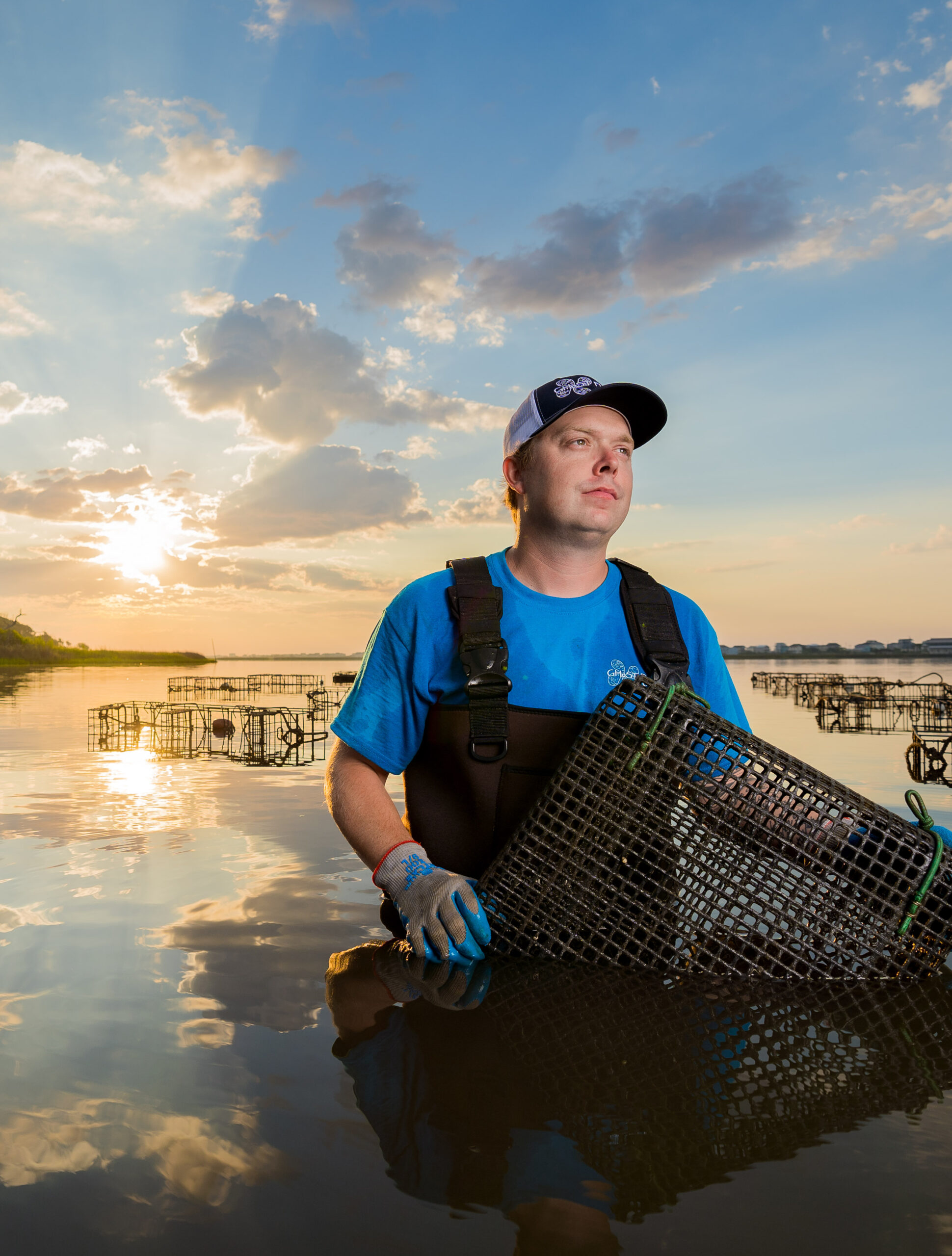BY CHRISTOPHER OSBURN
Christopher Osburn is a marine biogeochemist and University Faculty Scholar at NC State University. With support from NC State colleges, academic units, and centers, as well as North Carolina Sea Grant and the State Climate Office, he leads NC State’s Blue Economy working group, which seeks to establish a hub of innovation by producing, analyzing, visualizing, and communicating the data needed in support of an equitable and inclusive sustainable blue economy within a land-to-ocean context.
The global blue economy encompasses economic activity related to the ocean, including connected coastal watersheds. It is a great mix of sectors (agriculture, finance, engineering, as examples) and connects with emerging technologies (offshore wind, regenerative agriculture, carbon capture). As coastal communities develop their economies, equity and inclusivity must go hand in hand with development to enable economic opportunity that will truly create resilient and sustainable coastal communities.
In March, NC State University convened an inaugural workshop, “Creating Solutions for the Global Blue Economy,” at Carteret Community College and NC State’s Center for Marine Science and Technology in Morehead City. We promoted the workshop to NC State undergraduate and graduate students as a forum to learn about the challenges facing development of resilient and sustainable coastal economies. The aim was to inspire students to create teams around shared interests and pursue those ideas in entrepreneurship, research opportunities, and community service.

Jane Harrison’s talk included the success of the NC Oyster Trail, which promotes a variety of seafood businesses that sell oysters and other products, as well as fostering ecotourism through visits to shellfish farms. Credit: Justin Kase Conder / © 2021 Justin Kase Conder. Use with express permission only.
Jane Harrison, coastal economics specialist with North Carolina Sea Grant, kicked off the event with a comprehensive overview of the sectors within the blue economy relevant to North Carolina. She noted that the blue economy is a small but growing part of the state’s total economy, powering thousands of jobs. A key highlight was the success of the NC Oyster Trail, which promotes a variety of seafood businesses that sell oysters and other products, as well as fostering ecotourism through visits to shellfish farms.
Danya Perry, director of diversity, equity, and inclusion for Wake County, identified barriers to equitable economic opportunities that persist in coastal communities, noting that access to good education and investment in local human capital are keys to creating sustainable communities. With this context, attendees ideated during two separate sessions about how they might support stakeholders, address challenges, and help develop N.C.’s blue economy.
Attendees said that awareness of — and information about — the blue economy are challenges, as well as communicating the need for sustainable economic opportunities in coastal communities. Additional needs included more connectivity between research, stakeholders, and decision makers, and early public education of the challenges and opportunities of the blue economy.
In fact, attendees identified a critical need to facilitate information sharing and distribution by reducing barriers for the public to access and digest information from scholarly research and by facilitating K-12 education about the blue economy. They also viewed innovation in workforce development in coastal communities as a critical need.
Emil Runge and Krista Covey from First Flight Venture Center in the Research Triangle Park described how science and entrepreneurship come together in a business incubator aimed at technological innovation. Day 1 wrapped up with attendees touring a living shoreline project along Carteret Community College’s campus, led by Kristi Mroch from the college, and David Cerino, chair of the college’s Aquaculture Department, led a visit to the college’s aquaculture center.
Day 2 of the workshop started with a plenary of case studies of innovation in the blue economy. Ruoying He from NC State’s Department of Marine, Earth, and Atmospheric Sciences described his company Fathom Science’s use of environmental data and data science to create model-driven products for many economic sectors. David Cerino provided an overview of innovations and opportunities in aquaculture. Whitney Knollenberg, from NC State’s Department of Parks, Recreation, and Tourism Management, concluded the plenary with a fascinating look at tourism’s role in the blue economy.
The workshop’s final plenary included presentations by Mark Huang from the “bluetech” startup firm, SeaAhead, Inc., and Jason Caplan from NC State’s Poole College of Management on the topic of team-building and group development around shared interests. Each shared examples of how technology and innovation have been used to catalyze entrepreneurship and build companies based on meeting needs of stakeholders in the blue economy.
Attendees then identified ideas they wanted to work on, based on their previous day’s activities. Key challenges that attendees identified as topics for innovation included sustainable tourism, smart system technologies that enable renewable energy and ecosystem services, and improved science communication to enable increased public awareness and understanding of the blue economy. Attendees created concepts for ventures related to seafood source tracking, carbon neutral activities, science related to sustainable coastal communities, and connecting systems of information, public interest, and market demand.
Concluding the workshop, attendees shared their thoughts and impressions of the two days they spent thinking about the blue economy. They talked about those solutions they identified as “unexpected” and how there is something for everyone to do in combining innovation and entrepreneurship to address the challenges facing coastal communities. They had learned about new disciplines and opportunities as an introduction to entrepreneurial possibilities, and, further, they realized the need for equitable and sustainable economic development in coastal communities.
We look forward to seeing what future innovations attendees create for the global blue economy.